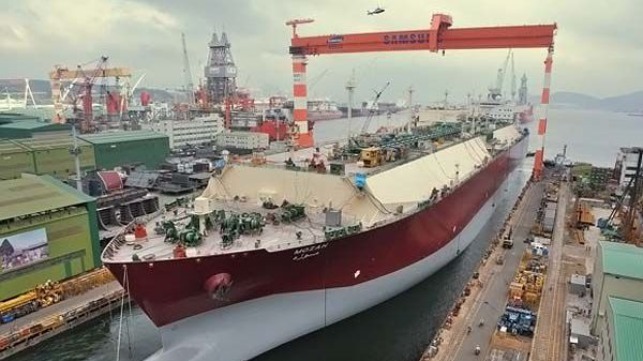Samsung to Explore MSR Nuclear Power for Zero Emission Shipping

South Korean shipbuilder Samsung Heavy Industries will undertake a joint research and development project with the Korea Atomic Energy Research Institute (KAERI), for the first modern exploration of nuclear-powered ships. Under the strategic cooperative agreement, they plan to explore the opportunities to use nuclear power as a solution for carbon-neutral shipping.
There was great interest in the use of nuclear power for commercial shipping during the 1950s, but in part due to safety fears and the economics, the technology never progressed. The United States built the first nuclear-powered passenger-cargo ship, the ns Savannah, as a demonstration vessel that operated commercially in the late 1960s, while Japan and Germany also built nuclear merchant ships. While nuclear power did not advance for merchant shipping, it became a key part of the world’s navies.
Samsung will be working with the much-discussed molten salt reactor (MSR), which has been promoted as a safer, lightweight solution that would require less capital investment for the shipping industry. The concept is based on a design that used lower grade nuclear material versus the weapons grade material required in the reactors aboard naval ships. It also does not require the high-pressure water-cooling systems used on submarines and nuclear aircraft carriers. In the MSR design, the uranium fuel is mixed with a chloride salt and if a leak occurs in the system the mixture solidifies, reducing the risk of explosion and contamination.
"MSR is a carbon-free energy source that can efficiently respond to climate change issues and is a next-generation technology that meets the vision of Samsung Heavy Industries," said Jin-Taek Jung, president of Samsung Heavy Industries. “We plan to focus our R&D efforts to create a new future growth engine.”
Through the agreement, Samsung plans to pioneer the MSR-based floating nuclear power plant and nuclear-powered ship market as part of its future new business expansion. The research will include MSR element technology and related equipment development, such as heat exchangers, offshore nuclear product design and business model development, performance verification, and economic evaluation.
Among the advantages Samsung sees for the technology is that the life of the reactor is projected at 20 years, the same as the life of the vessel, meaning the ship would not need to refuel. They highlight that the size of the reactor is relatively small, so it has the advantage of easy application to ships. In addition, the MSR design provides a higher level of safety and would prevent serious accidents.
